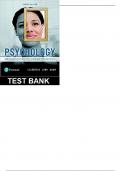,Chapter 1: Psychology and Scientific Thinking
Total Assessment Guide
Topic Factual Conceptual Applied
Quick Quiz 1 Multiple Choice 4, 8, 10 1, 6, 9 2–3, 5, 7
Quick Quiz 2 Multiple Choice 6, 9 1–2, 5, 7 3–4, 8, 10
Learning Objective 1.1a Multiple Choice 3–4, 10, 12 1–2, 5–6, 8 7, 9
Explain why psychology is Fill-in-the-Blank 1–2
more than just common Essay
sense. Critical Thinking
Learning Objective 1.1b Multiple Choice 15–16, 22–23, 33– 13–14, 17, 21, 24, 18–20, 25–28,
Explain the importance of 34, 36 29, 37–38 30–32, 35
science as a set of safeguards Fill-in-the-Blank 3
against biases. Essay 1
Critical Thinking 1 1
Learning Objective 1.2a Multiple Choice 39, 42–43, 46, 48– 47, 56 40–41, 45, 51–
Describe psychological 50, 58 55, 57, 119
pseudoscience and Fill-in-the-Blank 4–6
distinguish it from Essay 2
psychological science. Critical Thinking 2
Learning Objective 1.2b Multiple Choice 62–64, 68, 70, 76 44, 59–60, 69 61, 65–67, 71–
Identify reasons we are 75, 77
drawn to pseudoscience. Fill-in-the-Blank 7–8, 10–11 9, 12–13
Essay
Critical Thinking 3
Learning Objective 1.3a Multiple Choice 79–81, 85 78, 83–84 82
Identify the key features of Fill-in-the-Blank 14 15
scientific skepticism. Essay
Critical Thinking
Learning Objective 1.3b Multiple Choice 86, 88, 90–91, 97, 11, 96, 98, 104, 87, 89, 92–95,
Identify and explain the 99, 102, 109, 114, 108, 111–113 100–101, 103,
text’s six principles of 116–117 105–107, 110,
scientific thinking. 115, 118
Fill-in-the-Blank 17–19 16
Essay 3
Critical Thinking 4
Learning Objective 1.4a Multiple Choice 120–125, 129–130, 126, 131, 136 127–128, 133–
Identify the major theoretical 132, 135, 137 134
frameworks of psychology. Fill-in-the-Blank 20–23 24
Essay 4
Critical Thinking
Learning Objective 1.4b Multiple Choice 138, 140–141, 144 143 139, 142
Describe different types of Fill-in-the-Blank
psychologists and identify
Copyright ©Essay
2018, 2014, 2011 Pearson Education, Inc. All rights reserved.
what each of them does. Critical Thinking 1
,Topic Factual Conceptual Applied
Learning Objective Multiple Choice 146, 149, 151 147, 150 145, 148
90 Fill-in-the-Blank 25
1.4c
Describe the two great Essay 5–6
debates that have shaped Critical Thinking
the field of psychology.
Learning Objective Multiple Choice 152, 155 153–154
1.4d Fill-in-the-Blank 26
Describe how Essay
psychological research Critical Thinking
affects our daily lives.
Copyright © 2018, 2014, 2011 Pearson Education, Inc. All rights reserved.
2
, Name _____________________________________________
Chapter 1 Quick Quiz 1
1. A psychologist is often skeptical of claims suggesting that __________.
A) people are influenced by others’ thoughts and behaviors
B) a particular behavior is the result of a single causal variable
C) a person’s culture is a strong influence on his or her everyday thoughts and behaviors
D) a person’s future behavior is often difficult to predict accurately
2. Professor Clark gives her students an assignment to develop hypotheses on global warming. To be consistent with
a scientific method, students should develop their hypotheses based on __________.
A) their own existing beliefs about the issue B) reports discussed on television
C) untestable predictions D) a well-supported scientific theory
3. Curtis is considering buying a new workout machine that promises weight loss at twice the rate of other machines.
When Curtis questioned such a claim with the manufacturer, the customer service representative stated this was a
new system and previous research on weight loss was not applicable. This example illustrates which warning sign of
pseudoscience?
A) evasion of peer review B) absence of connectivity
C) overreliance on anecdotes D) lack of self-correction
4. Assuming that something is true simply because a teacher or religious authority said it is so, is an example of the
__________ fallacy.
A) appeal to authority B) circular reasoning
C) hasty generalization D) naturalistic
5. Dr. Wolpe designs an experimental test of his theory of aggression against a competing theory. After conducting
the appropriate statistical tests, he finds that the data are better explained by the competing theory. His willingness to
accept the evidence that another theory is superior is a characteristic of __________.
A) dogmatism B) gullibility
C) pathological skepticism D) scientific skepticism
6. An astute observer of human nature should state research questions in a manner that leads either to their being
supported or refuted by the available evidence. This is the critical thinking principle of __________.
A) falsifiability B) Occam’s Razor
C) replicability D) ruling out rival hypotheses
7. A classmate tells you the following: “It’s not how a teacher answers your question that matters, but how you
interpret his or her attempt at answering your question that leaves you satisfied or unsatisfied with his or her
answer.” This statement fits most closely with ideas from the school of thought known as __________.
A) behaviorism B) cognitivism
C) psychoanalysis D) structuralism
8. A __________ psychologist works in prisons, jails, and other settings to assess inmates and assist in
rehabilitation.
A) clinical B) school
C) biological D) forensic
Copyright © 2018, 2014, 2011 Pearson Education, Inc. All rights reserved.
3




